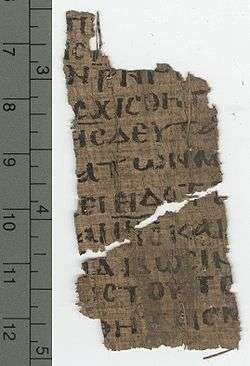Papyrus 122
Papyrus 122 (in the Gregory-Aland numbering), designated by 122, is an early copy of the New Testament in Greek. It is a papyrus manuscript of the Gospel of John.
| New Testament manuscript | |
 | |
| Name | P. Oxy. 4806 |
|---|---|
| Sign | 122 |
| Text | Gospel of John 21:11-14,22-24 |
| Date | 4th / 5th century |
| Script | Greek |
| Found | Oxyrhynchus, Egypt |
| Now at | Sackler Library |
| Cite | R. Hatzilambrou, P. J. Parsons, J. Chapa OP LXXI (London: 2007), pp. 11-14. |
| Size | [4.5] x [3.3] cm (28 x 12) |
| Type | Alexandrian (?) |
| Category | - |
| Note | concurs with codex W |
Description
To the present day survived only two pieces from one leaf. The surviving texts of John are verses 21:11-14,22-24, they are in a fragmentary condition. The manuscript paleographically had been assigned to the 4th or 5th century (INTF).[1] It was written by irregular hand.
It uses nomina sacra. Name Ιησους (Jesus) is abbreviated to ΙΗΣ (majority of manuscripts used abbreviation ΙΣ). Number "one hundred and fifty-three" is written in abbreviation — ΡΝΓ.
The Greek text of this codex probably is a representative of the Alexandrian text-type.
Text
In John 21:14 omitted word Ιησους (Jesus), just like in Codex Washingtonianus,[2] rest of the manuscripts contain this word, usually with an article (ο Ιησους).[3]
| Ανεβη ουν Σιμων Πετρος και ειλ | So Simon Peter went aboard and |
| κυσεν το δικτυον εις την γην μεσ | hauled the net ashore, full |
| τον ιχθυων μεγαλων ΡΝΓ και το | of large fish, a 153 of them; and |
| σουτων οντων ουκ εσχισθη το δικ | although there were so many, the net was not |
| τυον λεγει αυτοις ο ΙΗΣ δευτε αριστη | torn. Jesus said to them, “Come and have |
| σατε ουδεις δε ετολμα των μαθητων ε | breakfast.” Now none of the disciples dared |
| ξετασαι αυτων Συ τις ει ειδοτες οτι | ask him, “Who are you?” They knew |
| ο ΚΣ εστιν ερχεται ΙΗΣ και λαμ | it was the Lord. Jesus came and took |
| βανει τον αρτον και διδωσιν αυτοις | the bread and gave it to them, |
| και το οψαριον ομοιως τουτο ηδη | and so with the fish. This was now |
| τριτον εφανερωθη τοις μαθηταις | the third time that He was revealed to the disciples |
| εγερθεις εκ νεκρων | after He was raised from the dead. |
In red colour missing letters.
Location
The manuscript currently is housed at the Papyrology Rooms of the Sackler Library at Oxford with the shelf number P. Oxy. 4806.
References
- "Liste Handschriften". Münster: Institute for New Testament Textual Research. Retrieved 15 August 2011.
- Codex Washingtonianus has eclectic text, but in John 5:12 – 21:25 it represents the Alexandrian.
- Codex Sinaiticus, Codex Alexandrinus, Codex Regius, Codex Koridethi, Codex Zacynthius, f1, f13, and manuscripts of the Byzantine text-type (without article: Codex Vaticanus, Codex Ephraemi Rescriptus, and Codex Bezae).
Further reading
- R. Hatzilambrou, P. J. Parsons, J. Chapa The Oxyrhynchus Papyri LXXI (London: 2007), pp. 11–14.
External links
Images
- P.Oxy.LXIV 4806 from Papyrology at Oxford's "POxy: Oxyrhynchus Online"; only page recto is accessible.
Official registration
- "Continuation of the Manuscript List" Institute for New Testament Textual Research, University of Münster. Retrieved April 9, 2008